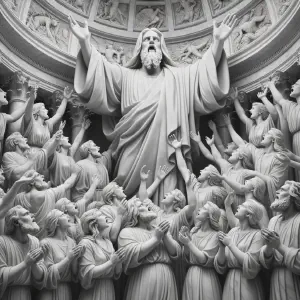The Faith of Abraham and the Greed of Man



The message was clear: Life is not about possessions but about being spiritually wealthy in the eyes of the Lord.
Five Questions
In the story of Abraham, we see a profound trust in God’s promise. How does Abraham’s faith compare to the faith we’re called to have today?
Abraham’s faith is a prime example of unwavering trust in God’s promises. He didn’t just believe in God; he believed God. Today, we’re called to have a similar faith, trusting in God’s plan for us, especially when faced with challenges or uncertainty. It’s a timeless call to believe not just in the existence of God, but in His love, mercy, and the promises He makes to us, much like the resurrection of Jesus.
The psalm speaks of a mighty savior born from David’s lineage. How does this connect with the New Testament?
The mention of a savior from David’s lineage directly points to Jesus Christ. In the New Testament, especially in the Gospels of Matthew and Luke, we see genealogies that trace Jesus’s ancestry back to David. This fulfills the Old Testament prophecies and promises about a Messiah who would come from David’s line, emphasizing Jesus’s rightful claim as the promised Savior.
In the parable of the rich man, Jesus warns against greed. How can we discern between being prudent for the future and being greedy?
It’s a fine line. Prudence calls for wise planning and ensuring that our basic needs and those of our loved ones are met. Greed, on the other hand, is an insatiable desire for more, often at the expense of others. The rich man’s error was not in planning for the future, but in hoarding excess without thought of sharing or gratitude to God. It’s essential to remember that everything we have is a gift from God, and true joy comes from sharing those blessings and being “rich in what matters to God.”
The rich man was preoccupied with material possessions. How can we cultivate a heart that’s “rich in what matters to God”?
Cultivating such a heart requires intentional effort. Regular prayer, reading scriptures, and engaging in acts of charity can help detach us from material desires and draw us closer to God. It’s also about fostering gratitude, recognizing the transient nature of earthly possessions, and prioritizing eternal treasures like love, kindness, and spiritual growth.
Lastly, the man in the crowd asked Jesus about inheritance, a material concern. How does Jesus’s response highlight the importance of spiritual inheritance over worldly possessions?
Jesus’s response is a reminder that our primary focus should be on our spiritual inheritance – the Kingdom of Heaven. While worldly possessions and inheritances are temporary, our spiritual inheritance is eternal. By cautioning against greed and emphasizing the importance of being spiritually wealthy, Jesus encourages us to invest in our relationship with God and to store up treasures in heaven, where they never perish.
Bible Study
Rom 4:20-25
Brothers and sisters:
Abraham did not doubt God’s promise in unbelief;
rather, he was empowered by faith and gave glory to God
and was fully convinced that what God had promised
he was also able to do.
That is why it was credited to him as righteousness.
But it was not for him alone that it was written
that it was credited to him;
it was also for us, to whom it will be credited,
who believe in the one who raised Jesus our Lord from the dead,
who was handed over for our transgressions
and was raised for our justification.
This passage emphasizes Abraham’s unwavering faith in God’s promises, making him a foundational figure in Judeo-Christian traditions. Abraham, known as the “Father of Faith,” demonstrated a deep trust in God, even when circumstances seemed contrary to God’s promises. His faith being credited as righteousness aligns with Catholic teachings on the importance of faith leading to justification. The passage also elucidates that this principle isn’t limited to Abraham alone but extends to all believers, emphasizing the core Catholic belief in the resurrection of Jesus and its significance for humanity’s salvation.
Luke 1:69-75
R. (see 68) Blessed be the Lord, the God of Israel; he has come to his people.
He has come to his people and set them free.
He has raised up for us a mighty savior,
born of the house of his servant David.
Through his holy prophets he promised of old
that he would save us from our enemies,
from the hands of all who hate us.
He promised to show mercy to our fathers
and to remember his holy covenant.
This was the oath he swore to our father Abraham:
to set us free from the hands of our enemies,
free to worship him without fear,
holy and righteous in his sight all the days of our life.
This responsorial psalm hails the Lord’s faithfulness to Israel. It recalls God’s covenant with Abraham and how it culminated in the coming of the Savior from David’s lineage. David, the revered king, and prophet of Israel, is a key figure representing the messianic promise in the Old Testament. The psalm underscores God’s mercy, protection, and the fulfillment of His promises, aligning with Catholic values of faith in God’s providence and the importance of historical covenants in understanding salvation history.
Mt 5:3
R. Alleluia, alleluia.
Blessed are the poor in spirit;
for theirs is the Kingdom of heaven.
R. Alleluia, alleluia.
This beatitude from Jesus’ Sermon on the Mount underscores the value of humility and spiritual poverty. “Poor in spirit” denotes recognizing one’s own spiritual emptiness and the need for God. This teaching is central to Catholic values, emphasizing humility, spiritual dependence on God, and the hope of the Kingdom of Heaven for those who recognize their spiritual need.
Lk 12:13-21
Someone in the crowd said to Jesus,
“Teacher, tell my brother to share the inheritance with me.”
He replied to him,
“Friend, who appointed me as your judge and arbitrator?”
Then he said to the crowd,
“Take care to guard against all greed,
for though one may be rich,
one’s life does not consist of possessions.”
…
Thus will it be for the one who stores up treasure for himself
but is not rich in what matters to God.
In this Gospel passage, Jesus uses a request about inheritance to teach about the dangers of greed and materialism. The parable of the rich man illustrates the futility of hoarding material wealth at the expense of spiritual richness. This aligns with Catholic teachings on the primacy of spiritual values over material pursuits, emphasizing the tenets of the Seventh Commandment (against stealing) and the Tenth Commandment (against coveting). It also reinforces the Catholic emphasis on acts of mercy, particularly in sharing with the needy, and the importance of discerning and prioritizing what’s truly valuable in God’s eyes.
Lessons
In these sacred passages, we are lovingly reminded of the profound virtues of unwavering faith and humility. Abraham, our revered forefather, exemplifies deep trust in God’s promises, teaching us that genuine faith is not only believing in God’s words but living them. The psalm beautifully echoes God’s enduring commitment to His people and the fulfillment of His covenants. Jesus, in His boundless wisdom, alerts us to the perils of materialism and greed, emphasizing that true wealth is not found in worldly possessions but in a heart rich in devotion to God. As Catholics, we are called to internalize these lessons, placing God at the center of our lives, prioritizing spiritual growth over transient earthly gains, and continually seeking the Kingdom of Heaven with a humble and contrite heart.
Meditation Prayer
O Lord, our God, Creator of Heaven and Earth,




Lord, as we continue our journey, grant us the wisdom to discern Your will and the courage to act upon it. Stir within us a burning desire to share the treasures of Your Word with others, fostering a world anchored in love, faith, and hope.
In Jesus’ name, we pray. Amen.